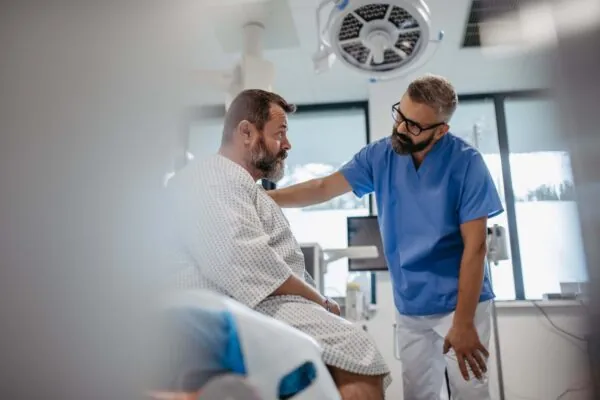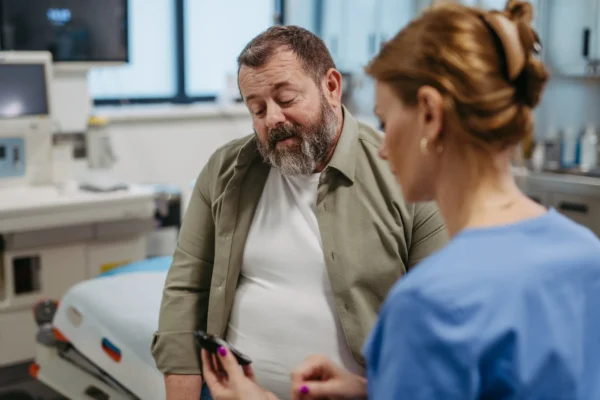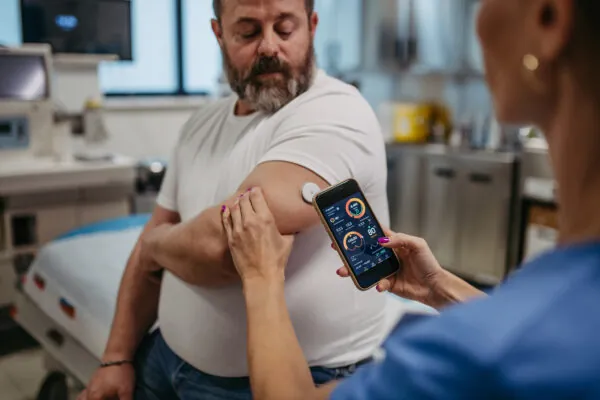Gastric bypass surgery is regarded as the gold standard procedure for the surgical treatment of severe obesity. It has been gradually refined over the past 30 years to produce a reliable, highly effective operation with a low risk of serious side effects.The gastric bypass is regarded as the gold standard, not least because of its consistent and excellent results in achieving sustained weight loss and resolution of diabetes. The typical target is to lose about 70–80% of excess weight within two years.

On this page
How it works
Roux-En-Y Gastric Bypass
This procedure is carried out laparoscopically (keyhole surgery) and uses special equipment to alter the way food flows through the intestines. First the stomach is turned into a small pouch, (about the size of a large egg). Next the small intestine is carefully measured, transected, and reattached onto the new stomach pouch. The pouch only allows smaller quantities of food into it and bypasses the rest of the stomach and the first metre or so of small intestine. The body reacts to this change by releasing large quantities of naturally occurring gut hormones after food, that suppress appetite and improve the way the body controls blood sugar levels. Whilst it is true that the gastric bypass does affect the absorption of food, this effect is really quite mild, and so it is unusual for bypass patients to suffer with side effects of malabsorption such as diarrhoea or severe nutritional problems.
A stricture (narrowing) of the newly created opening between stomach pouch and intestine is a fairly common problem in the early months after the procedure, but this is easily treated by stretching the narrowed area with a small balloon that is passed down a gastroscope (a flexible camera used to examine the stomach under sedation). Early surgical complications mirror those of the Gastric Sleeve/sleeve gastrectomy, including staple line leakage, bleeding and injury to other internal structures. All these complications can be minimised by ensuring the procedure is carried out by experienced surgeons with a good multi-disciplinary team. Later major problems are uncommon, but clinicians need to be aware of the increased risk of gallstones after rapid weight loss and unusual presentations of abdominal pain (often in the absence of vomiting) that might indicate the rare problem of an internal (Petersen’s) bowel hernia.
Dumping syndrome is worthy of a special mention as it is often referred to in a negative sense when gastric bypass is discussed. Dumping (which results from rapid emptying and absorption of sugars within the small bowel) is uniquely associated with the gastric bypass. As these high volumes of sugars are absorbed there is an over-exaggerated insulin response. This causes the blood sugar levels to fall rapidly and the patient experiences symptoms of hypoglycaemia (low blood sugar) such as anxiety, sweating, dizziness and fainting. It is often preceded by stomach cramps and diarrhoea, the net effect of which is to bring about a most helpful degree of wariness in the chocolate-loving bariatric patient.
Read the related article: Gastric Bypass Turkey: Is Turkey Weight Loss Surgery Safe? Know the Risks Before You Try

One Anastomosis Gastric Bypass OAGB
The One Anastomosis Gastric Bypass (OAGB), also known as mini-gastric bypass is a minimally invasive procedure performed laparoscopically. During the OAGB procedure, the surgeon first reduces the size of the working stomach by creating a tube connected to the lower end of the gullet that is separate from the rest of the stomach. This tubular gastric pouch is then connected (anastomosed) to the small intestine, bypassing up to 200cm of the intestine that would otherwise be used to absorb food. This technique differs from the traditional Roux-En-Y Bypass (RYGB) which requires two connections (anastomoses).
OAGB typically results in loss of 30% to 40% of body weight (60-80% excess weight loss). The most rapid weight loss occurs in the first 6 months after surgery and then continues at a slower pace for up to another 18 months. This weight loss is achieved through restriction (the new gastric pouch can only hold a smaller quantity of food) malabsorption and most importantly by changing the levels of various natural gut hormones that are key to how the body controls appetite and the sensation of fullness. Substantial weight loss may lead to dramatic improvement, and even complete remission of many of the obesity-related medical problems. Long-term data shows that OAGB may result in a slightly better weight loss and resolution of diabetes than the RYGB.
The OAGB has few long term complications. Less than 5% of the patients may require revision surgery, with half of the revisional surgeries due to poor nutrition when longer lengths of small bowel are bypassed and the other half due to bile reflux, ulcer and/or weight regain.
The advantage of the OAGB is its relative simplicity, compared to the Roux-En-Y gastric bypass. The single anastomosis results in a shorter operating time and less operative complications. Long term, the OAGB results in fewer intestinal obstruction problems and less risk of internal bowel hernias.
One of the disadvantages of the OAGB include a greater likelihood that patients with OAGB will experience bile reflux than after a Roux-En-Y gastric bypass, which might affect their quality of life. The role of increased bile reflux as a possible risk factor for later development of gullet cancer is controversial. Another disadvantage of OAGB is a greater likelihood that the patient will develop significant vitamin and micronutrient deficiencies over time. Patients receiving OAGB must take regular vitamin and mineral supplements as instructed, and undergo lifelong, yearly monitoring.
How Does Recovery Look Like:
Aftercare and Recovery:
On your first night following surgery, the nursing staff will monitor you carefully, checking your blood pressure and other vital measurements regularly throughout the night. You will be allowed to drink fluids straight away and will also have additional fluids via a drip. Pain killers and anti-sickness medications will be given to you as needed.
In the morning following the operation, you will have breakfast (liquidised diet). It is important to start moving and walking as soon as possible after the operation. During your hospital stay and for three weeks afterwards, you will be given a small injection under your skin to thin your blood slightly to reduce the risk of you forming clots in your legs (deep vein thrombosis).
On the second day following the operation, the dietician will review you on the ward and provide further advice about your diet. It is expected usually that you will have a liquid-only diet for about 2-3 weeks, followed by soft, ‘mashed-up’ food for another 2-3 weeks. Afterwards this, you can progress to normal solid food, just in much smaller quantities now.
Your surgeon will review you on a daily basis during your hospital stay. Most patients stay in the hospital for two nights and go home on their second day after surgery.

Medication & Wound Care:
On your day of discharge, the hospital will supply you with the medications you need following surgery which will include:
- Anti-acid medication – taken for three months after surgery
- Vitamins – to be continued indefinitely
- Pain killers
- Blood-thinning injections (daily for three weeks following surgery)
Your surgeon will either use dissolvable stitches, surgical glue or clips to close the skin at the end of your operation. All of these techniques produce similar results in terms of the final appearance of your scars. If clips are used, you will usually have them taken out 10 days after the surgery at your local GP practice. The nursing staff will check your wound healing during your hospital stay and give you instructions on wound care before your discharge.

Exercise post-op:
You will be encouraged to mobilise and walk straight after surgery. Gentle exercises like walking, housework and swimming could be started shortly after surgery. However, heavy lifting and strenuous gym work should be avoided for the first 6 weeks following surgery.

What are the side effects and risks of a Gastric Bypass?
There are several potential complications of gastric bypass. Your surgeon will explain these risks to you in detail during your consultation with him/her before the operation.
The following are serious or frequently occurring risks. Fortunately, most of them are uncommon, particularly in the hands of an experienced bariatric surgeon team like Phoenix Health:
Short-term risks:
- General Anaesthesia complications (heart attack, chest infection, sickness and vomiting).
- Bleeding (blood transfusion may be required)
- Infection and wound pain
- DVT and datal/non-fatal PE (blood clots in the legs and lungs)
- Organ, bowel or vascular damage including the risk of splenectomy (removal of the spleen).
- Conversion from laparoscopic (keyhole) to open surgery
- Anastomotic leak (1%) which may require further surgery and a prolonged hospital stay on the ward and/or intensive care.
- Death (1 in 500 chance)
- Dumping syndrome and bowel disturbance
- DVT and pulmonary embolism (blood clots in the legs and lungs)
- Portal Vein Thrombosis – an extremely rare but serious complication

Long-term risks:
- Anastomotic ulcer, fistula and/or stricture (narrowing) or twist requiring post-operative dilatation (stretch) or re-operation.
- Hypoglycaemia
- Bowel obstruction/ strangulation (internal hernia/ adhesions)
- Bile Reflux and sequelae including theoretical increased risk of esophagogastric malignancy
- Nutritional deficiencies (vitamins, minerals, protein)
- Alopecia (hair loss)
- Gallstone formation (10% risk of future cholecystectomy)
- Excessive weight loss and/or loose skin on stomach, thigh, arms and breasts
- Poor weight loss
- Weight regain (10% chance over 5 years)
- Psychological difficulties adapting to weight loss and its consequences.

Is the gastric bypass reversible?
Gastric bypass is potentially reversible. Reversing a gastric bypass, though, is a complex surgery and is only done in very selective scenarios like malnourishment. Therefore, we encourage our patients to think of it as a permanent operation.

Is a gastric bypass right for me?
A gastric bypass is an effective weight-loss surgery which reduces your weight and improves/resolves many of the obesity-related medical conditions you might have. It will also improve your ability to perform routine daily activities and can help improve your quality of life.
Your surgeon might recommend gastric bypass to you if:
- Your body mass index (BMI) is 35 or higher, or if your BMI is above 30 and you also suffer from obesity related medical conditions which may improve with the surgery (e.g., diabetes, high blood pressure or sleep apnoea). If you are of Asian or Afro-Caribbean origin, the BMI cut-off is even lower because the risk of metabolic diseases starts at BMI’s as low as 27.
- Your diet contains a large number of sugary foods – gastric bypass might be a better choice for people with a sweet tooth.

Aftercare that’s second to none
We are committed to ensuring that you receive the absolute highest standards of service. That’s why we let you design your own aftercare package to suit your own individual needs.
We offer 3 different choices including our Standard Silver package or our Gold and Platinum Enhanced Aftercare packages.
Choose the aftercare package that’s right for you…
Silver Package
What’s Included…
Treatment of complications at no extra cost for 3 months post-op
Free follow up and band fills for 2 years
Gold Package
What’s Included…
Treatment of complications at no extra cost for 12 months post-op
Free follow up and band fills for 5 years
Surgeon-led follow up
Bariatric gift box
8 consultations with Senior Clinical Psychologist pre/post-op
Platinum Package
What’s Included…
Treatment of complications at no extra cost for 36 months post-op
Free follow up and band fills for 10 years
Surgeon-led follow up
Bariatric gift box
16 consultations with Senior Clinical Psychologist pre/post-op
How Much Does Gastric Bypass Surgery Cost in the UK?
The gastric bypass surgery cost in the UK varies depending on your unique needs and the care provided during your weight loss journey. At Phoenix Health, our experienced gastric bypass surgeons offer comprehensive packages that include expert aftercare, personalised dietary guidance, and ongoing support to help you achieve long-term success. For detailed information on the gastric bypass cost and what is included, contact us today. We are here to support you every step of the way with transparent pricing and expert care.
Ask an Expert
Please fill in the form below or call us on 03452 515 515 and a member of our team will be happy to help with your enquiry.